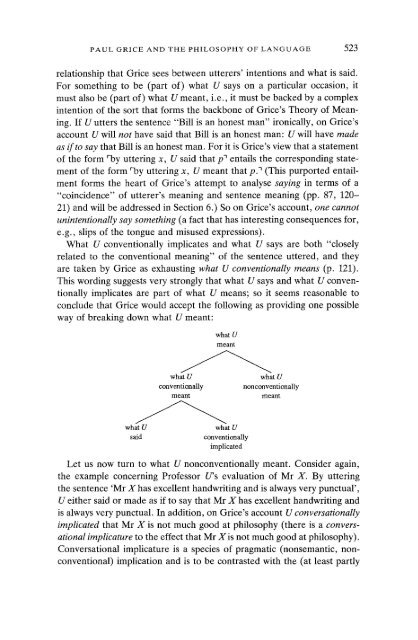Paul Grice and the philosophy of language
Paul Grice and the philosophy of language
Paul Grice and the philosophy of language
Create successful ePaper yourself
Turn your PDF publications into a flip-book with our unique Google optimized e-Paper software.
PAUL GRICE AND THE PHILOSOPHY OF LANGUAGE 523<br />
relationship that <strong>Grice</strong> sees between utterers' intentions <strong>and</strong> what is said.<br />
For something to be (part <strong>of</strong>) what U says on a particular occasion, it<br />
must also be (part <strong>of</strong>) what U meant, i.e., it must be backed by a complex<br />
intention <strong>of</strong> <strong>the</strong> sort that forms <strong>the</strong> backbone <strong>of</strong> <strong>Grice</strong>'s Theory <strong>of</strong> Meaning.<br />
If U utters <strong>the</strong> sentence "Bill is an honest man" ironically, on <strong>Grice</strong>'s<br />
account U will not have said that Bill is an honest man: U will have made<br />
as if to say that Bill is an honest man. For it is <strong>Grice</strong>'s view that a statement<br />
<strong>of</strong> <strong>the</strong> form rby uttering x, U said that p~ entails <strong>the</strong> corresponding statement<br />
<strong>of</strong> <strong>the</strong> form ~by uttering x, U meant that p.7 (This purported entailment<br />
forms <strong>the</strong> heart <strong>of</strong> <strong>Grice</strong>'s attempt to analyse saying in terms <strong>of</strong> a<br />
"coincidence" <strong>of</strong> utterer's meaning <strong>and</strong> sentence meaning (pp. 87, 120-<br />
21) <strong>and</strong> will be addressed in Section 6.) So on <strong>Grice</strong>'s account, one cannot<br />
unintentionally say something (a fact that has interesting consequences for,<br />
e.g., slips <strong>of</strong> <strong>the</strong> tongue <strong>and</strong> misused expressions).<br />
What U conventionally implicates <strong>and</strong> what U says are both "closely<br />
related to <strong>the</strong> conventional meaning" <strong>of</strong> <strong>the</strong> sentence uttered, <strong>and</strong> <strong>the</strong>y<br />
are taken by <strong>Grice</strong> as exhausting what U conventionally means (p. 121).<br />
This wording suggests very strongly that what U says <strong>and</strong> what U conventionally<br />
implicates are part <strong>of</strong> what U means; so it seems reasonable to<br />
conclude that <strong>Grice</strong> would accept <strong>the</strong> following as providing one possible<br />
way <strong>of</strong> breaking down what U meant:<br />
what U<br />
meant<br />
what U<br />
conventionally<br />
meant<br />
what U<br />
nonconventionally<br />
meant<br />
what U<br />
said<br />
what U<br />
conventionally<br />
implicated<br />
Let us now turn to what U nonconventionally meant. Consider again,<br />
<strong>the</strong> example concerning Pr<strong>of</strong>essor U's evaluation <strong>of</strong> Mr X. By uttering<br />
<strong>the</strong> sentence 'Mr X has excellent h<strong>and</strong>writing <strong>and</strong> is always very punctual',<br />
U ei<strong>the</strong>r said or made as if to say that Mr X has excellent h<strong>and</strong>writing <strong>and</strong><br />
is always very punctual. In addition, on <strong>Grice</strong>'s account U conversationally<br />
implicated that Mr X is not much good at <strong>philosophy</strong> (<strong>the</strong>re is a conversational<br />
implicature to <strong>the</strong> effect that Mr X is not much good at <strong>philosophy</strong>).<br />
Conversational implicature is a species <strong>of</strong> pragmatic (nonsemantic, nonconventional)<br />
implication <strong>and</strong> is to be contrasted with <strong>the</strong> (at least partly














